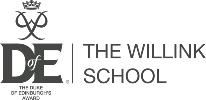Religious Education
RE is an integral and essential part of our curriculum, it enables us to understand other people and gives pupils the opportunity to explore different points of view and how this makes a difference to the lives of individuals and communities. We live in multi-faith and multicultural society, and by studying RE students become aware of the importance of the diversity of religious and non-religious world views that exist in our global society, including the UK.
RE provides the opportunity for students to ask Big Questions. These are questions which do not have an easy answer but encourage us to think deeply and critically about the possible answers. RE lessons are an opportunity for pupils to listen to each other and share their ideas and opinions on thought provoking topics and expand their curiosity.
Key Staff
- Mrs Obsiye - Head of Department (Maternity Leave)
- Mr Burgess - Head of RE (maternity cover), Head of Geography & DofE Lead
- Mrs Enslin - Teacher of Humanities and Social Sciences
- Mr Forsyth -Teacher of Humanities
- Miss Mace - Head of Humanities
- Mr Ryder - Teacher of Religious Education
- Ms Stacey-Field - Teacher of Religious Education
Key Stage 3 - Years 7 and 8
Religious Education Milestone Assessment KS3 2024-25
At KS3 we follow the West Berkshire Agreed Syllabus and pupils have one lesson per week.
Year 7
Students explore and question different types of truth and consider different ways of thinking and believing. They gain a grounding in the 6 Major World Religious Traditions and other world views including non-religious ones. Students have the opportunity to investigate aspects of religion belief that interests them during the World Religion Project. Year 7 students also explore the significance of religious festivals in the lives of individuals and communities and the role of Religion in the local context of Reading.
Year 8
Students take an in-depth look at the Religion of Buddhism and explore fascinating beliefs and practices including Karma and Reincarnation. Students move onto exploring ethical and moral issues such as peace and conflict, the environment and prejudice and discrimination. Students gain an understanding of how different worldviews approach these themes and topics and the impact and relevance of them in society today.
Key Stage 4 Plus Year 9 Compulsory GCSE
In Years 9, 10 and 11 ALL students must take one lesson of RE per week by law and in line with OFSTED’s recommendation.
The course is entitled Eduqas Religious Studies (Route A) and is interesting and varied. Students will gain a strong grounding of the beliefs and practices of two major and diverse religions, Christianity and Islam. The GCSE gets students to explore a range of pertinent philosophical and moral issues impacting our world today. It enables students to develop critical thinking skills and encourages them to articulate their own viewpoints clearly and concisely while considering the views of others and the impact of belief and practices on individuals, communities, and society.
It covers the following topics:
Study of Christianity
- Christian Beliefs
- Christian Practices
Study of Islam
- Islamic Beliefs
- Islamic Practices
Philosophy and Ethics in the modern world
- Issues of Relationships
- Issues of Life and Death
- Issues of Good and Evil
- Issues of Human Rights
All sections will be studied from the viewpoint of Christianity, Islam and Humanism.
Students will sit all Exams at the end of Year 11.
| Philosophical And Ethical Studies in the Modern World | Study of Christianity | Study of Islam |
| 50% of final mark | 25% | 25% |
| 2 hour exam | 1 hour exam | 1 hour exam |
Key Stage 5 (A Level ,Exam Board: AQA) - Years 12 and 13
A Level Religious Studies is a fascinating subject and provides pupils with a thorough grounding in religious, diverse philosophical and ethical viewpoints. This course consists of the Philosophy of Religion and Ethics in which the approach of philosophy to the study of religion and belief will be explored. In addition, this course provides strong grounding in the application of natural moral law, situation ethics and virtue ethics as well as an introduction to meta-ethics. Key to the topics will be the arguments put forward by imminent philosophers in this area including Hume, Kant and Anslem.
In the second part of this course there will be a strong focus on the study of Islam, the 2nd largest religion in the world. This component will investigate the key beliefs of Islam, values and its religious expression across different communities and societies. There will be exploration into Islam and its relationship to science and Islam and the challenges of secularisation as well as Islam, migration, gender, and religious pluralism. The course further consists of the study of dialogues, which explores the dialogue between Islam and Philosophy and Islam and ethics.
|
Component 1: Philosophy of Religion and Ethics |
Component 2: Study of Religion and Dialogues |
|
50% of A Level |
50% of A Level |
| 3-hour exam | 3-hour exam |







